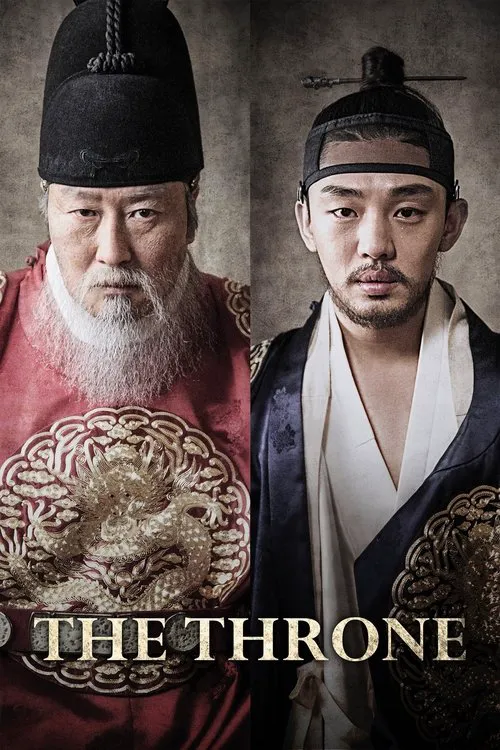The Throne

Plot
The Throne, also known as Sado, is a 2015 South Korean historical drama film directed by Lee Jun-ik. Set in the Joseon Dynasty's era, around July 1762, the film delves into the tragic story of Crown Prince Hyojang, who was later posthumously named Sado. He was the eldest son of King Yeongjo, the 21st king of the Joseon Dynasty. The story takes a dark turn when the Crown Prince is falsely accused of treason by his own father. As a result, King Yeongjo orders his son to take his own life, adhering to the traditional practice of the "punishment by rice chest." This ancient ritual entailed a traitor being confined inside a wooden rice chest for several days without food or water to symbolize their guilt. However, the Crown Prince's closest vassals, led by Prince Sujang, intervene to prevent the execution. They plead with the king to reconsider the severity of the punishment, but their appeals fall on deaf ears. In an attempt to persuade his son to accept the king's decision, King Yeongjo orders the Crown Prince to get inside a large, airtight wooden rice chest, designed to resemble a rice bin. This gruesome device has become synonymous with the punishment for perceived traitors in the Joseon Dynasty. Once inside, the Crown Prince faces unimaginable torment, struggling to survive the arduous conditions within the chest. The film shows the prince's desperate attempts to find a means of escape or at least secure a little more comfort within his confined space. He tries to shout out for help but is met with complete silence. His isolation, paired with the oppressive darkness and scarcity of air, takes a devastating toll on his mental health. The story does not only focus on the Crown Prince's suffering but also explores the complicated family dynamics that led to his predicament. As tensions rise within the palace, alliances are tested and secrets are revealed. The intricate web of relationships between the royal family members and their courtiers becomes a catalyst for the chaos that ensues. This is beautifully portrayed through the film's gripping narrative and outstanding performances from the cast. One of the standout elements of The Throne is its historical accuracy. The period setting is meticulously recreated, and the costumes, settings, and props are authentic representations of 18th-century Korea. The film also explores themes that are universally relevant, including family dynamics, loyalty, power struggles, and the psychological effects of trauma. Despite its dark subject matter, the movie does not shy away from depicting the complexities of human nature and the intricacies of the royal court. As the days pass, the Crown Prince becomes increasingly frail, and his mental state worsens. His attempts to find solace through writing poetry, a skill he has mastered, bring him temporary comfort but do little to alleviate his suffering. As King Yeongjo's determination to prove his son's guilt grows, the prince's situation becomes even more dire. He is subjected to cruel conditions, and his body begins to deteriorate as he struggles to cope with the harsh circumstances. In the end, it becomes clear that the events unfolding at the royal court will have far-reaching consequences, shaking the very foundations of the monarchy. The Throne paints a vivid picture of a society ruled by absolute authority, where those in power can make their subjects suffer with impunity. Throughout the film, the cinematography and lighting work together to create a haunting atmosphere, perfectly capturing the tension, despair, and desperation felt by the Crown Prince. The cinematographer's masterful use of light and shadow creates a sense of claustrophobia, mirroring the confined space in which the prince is forced to endure. As for the main character's psychological state, the film takes a poignant look at how such prolonged, inhumane treatment would affect anyone placed in his position. His growing desperation, coupled with the overwhelming despair that defines every waking moment, raises poignant questions about humanity's capacity for resilience, the fragility of the human psyche, and the cruel nature of absolute power. Ultimately, The Throne serves as a powerful reminder of the complexities and cruelties of the past. This gripping film offers a thought-provoking portrayal of one of the most notorious incidents in Korean history, inviting viewers to reflect on the devastating impact of unchecked power and the devastating consequences of blind ambition.
Reviews
Recommendations




